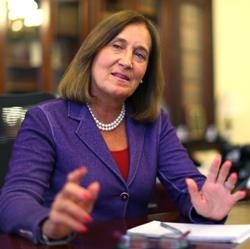Massachusetts Renews Online Lottery Push for 2017

Massachusetts has been working hard to bring its lottery product online for a number of years now without making much headway. Despite Massachusetts State Treasurer Deborah Goldberg’s best efforts, some lawmakers remain resistant to the idea, but those analysts familiar with Massachusetts are now predicting that 2017 will be the year when online lottery advocates finally get serious about the fight, and push hard against the naysayers.
Naysayers and Casino Interests
A number of state representatives have gone on the record opposing an online lottery system, with one of the most vocal being Representative Paul Heroux, a Democrat representing Attleboro. He has said that while he realizes the state will make money from online lottery sales, he believes it is almost predatory to sell lottery tickets over the internet. Another person who agrees is Les Bernal, executive director of Stop Predatory Gambling, who explains:
“It’s dangerous to anyone who gets exposed to internet gambling. Think about all the people who spend all their time on internet games and social media games. That the state government wants to exploit and cheat people is one of the biggest injustices in our state today.”
While the national nonprofit organization obviously has a cause to advance, some people have at least questioned representative Paul Heroux’s motives, though, citing the fact that the Plainridge Park Casino located in his district has asked the legislature to use caution when considering the expansion of gambling online. The casino believes that such efforts would hurt its business and the other casinos operating in the state.
Bill Passed State Senate
At the end of 2016, the Massachusetts State Senate did manage to pass a bill to legalize online lottery sales by a margin of 39 to 1; however, the Massachusetts House of Representatives never even voted on the bill. In the meantime, Goldberg has announced that she will propose another bill for legalization to the House in 2017, and in a recent talk given at a Chamber of Commerce meeting, Goldberg said that she wasn’t going to back down from her efforts to bring the Massachusetts lottery online.
Goldberg Changes Tune
It’s clear that Goldberg is determined, but it’s interesting to learn that she didn’t always favor online lottery sales. Throughout her campaign, she spoke about overhauling the Massachusetts Lottery system to make it more profitable for the state; however, she told the press she wasn’t sure that online lottery sales was the way to go. At the time, she said that it would be difficult to control online sales and that she did not want to encourage those with gambling addictions to overplay.
After taking office, Goldberg almost immediately changed her tune, echoing the position of her predecessor Massachusetts State Treasurer Steve Grossman, who was a supporter of all forms of online gambling. In fact, Goldberg’s office has subsequently estimated the lottery will generate $965 million this year in terms of municipal funding, down from last fiscal year’s total of $986.9 million. Meanwhile, scratch ticket sales, which generate the lottery’s biggest revenues, are continuing to decline and for the first five months of fiscal 2017, are currently lower by 3% versus the same period of time in 2016.
Need to Modernize
Goldberg has explained that the prevalence of online sales overall, the competition from daily fantasy sports, and the age of the people playing the Lottery all make it necessary to expand sales to the Internet. She believes that doing so is a crucial step in modernizing the Massachusetts Lottery and making it appealing to a new generation of players. Commenting on her flip-flop on the issue, she explained:
“I had to come around to this thinking because I myself hadn’t thought about online lottery games, but I saw the way millennials are operating is really online. This past Christmas shopping season, Cyber Monday outperformed Black Friday. We really want to be prepared to have a more modern, forward-thinking product.”
Goldberg’s statements echo those expressed at a panel that took place during the G2E conference entitled Intersection of iGaming and Lottery. It discussed the fact that while lottery sales spike when games like the Powerball have huge jackpots, overall the number of people who play is declining, and the population that plays is aging. The panel reported that lottery systems would need to be revamped through new games and online sales to remain viable.









